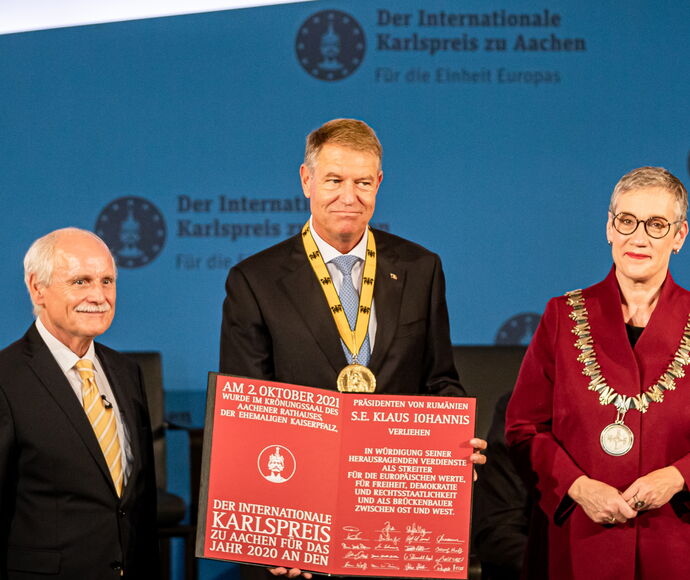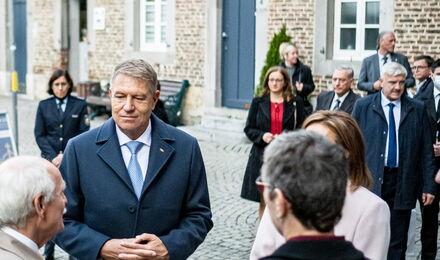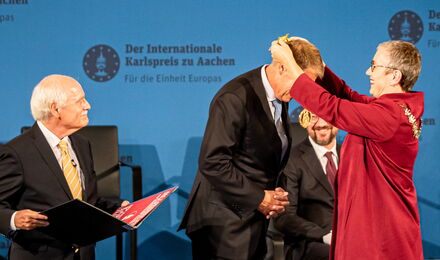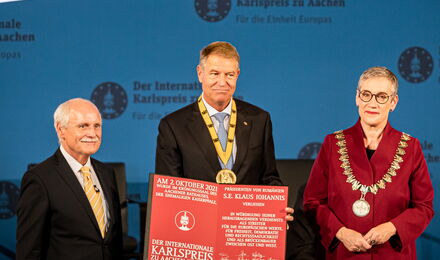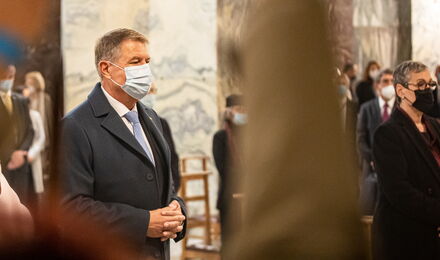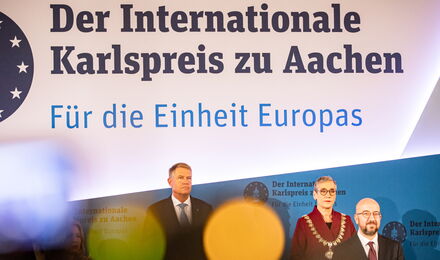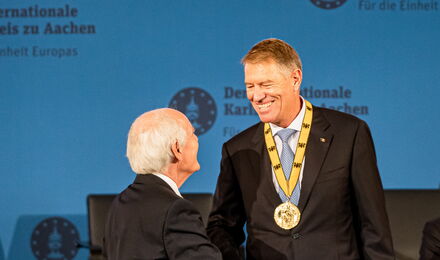Today, the European Union is divided and divided on many key issues. In the face of major global challenges, however, it needs unity, mutual recognition and reconciliation. The European canon of values, the strengthening of the European community of law and the common idea of a European future are embodied in the East by the 2020 Charlemagne Prize winner, the President of Romania, Klaus Johannis.
Step by step, he has turned a country that overcame a brutal dictatorship, but was also disappointed in its expectations of the West after the fall of communism in 1989, into the most European country in southeastern Europe.
While others adopt national-conservative, even right-wing populist attitudes towards the European Union, Johannis has led Romania towards a pro-European, constitutional policy with great commitment and success. Johannis strengthens the European Union, is committed to its goals and cooperation between the member states. What he has achieved for Romania is one of the greatest advances in integration since 1989, and he is a great campaigner for fairness, the protection of minorities and cultural diversity and an important mediator and bridge-builder between Western and Eastern European societies.
His path has created the legal and efficient environment for the economy that is so important for the community of values of the European Union, with which Romania presents itself to the EU as a modern, future-oriented and hopeful country.
Klaus Johannis (Romanian: lohannis) was on June 13, 1959 in Sibiu/Hermannstadt. He belongs to the Romanian-German ethnic group of the Transylvanian Saxons and considers himself to be "ethnically German and a Romanian citizen". After studying physics at the Babes-Bolyai University in Cluj-Napoca, he taught as a secondary school teacher in Sibiu from 1983, before becoming Deputy Inspector General of Schools in 1997 and then Chief Inspector General of Schools in Sibiu County in 1999.
A member of the Democratic Forum of Germans in Romania (DFDR) since 1990, he was elected mayor of his home town as its candidate in 2000 - already at a time of strong domestic political unrest and polarization. His election result of just under 70 percent of the vote was all the more remarkable given that only a tiny proportion of the population belonged to the Transylvanian minority.
He got into politics "quite by chance", he later reported in retrospect. "What am I doing there? I think it simply has something to do with the fact that l've probably tackled things the right way most of the time." - Quite obviously; and above all successfully. In any case, he was confirmed in office in 2004, 2008 and 2012 with overwhelming majorities of more than 75 percent.
The main reason for this was the development that Sibiu/Hermannstadt underwent under his leadership.
Thanks to a clever combination of the liberalization of the administration and the promotion of millions in investments - including from European partner countries - the economy took off.
Within just a few years, Sibiu/Hermannstadt went from being a rather neglected regional city to one of the most culturally diverse, well-developed and prosperous centers in the entire country, a highly attractive tourist destination - in short, a Romanian model of success and excellence. The redevelopment of the old town, the renewal of the city's infrastructure and, last but not least, its selection as European Capital of Culture in 2007 (together with Luxembourg) all bear the signature of Johannis.
"The local investors have come to know and appreciate the location, and practically all of them have expanded. Most of them have doubled their capacities in recent years. Large German companies are continuing to expand. This all shows that the city also provides a good workforce," he summed up soberly and pragmatically towards the end of his term of office.
At the beginning of 2013, Johannis, who already been discussed as a possible head of government in 2009, joined the national-liberal PNL, which elected him deputy chairman shortly afterwards. In June 2014, he became chairman of the party, which nominated him as the candidate of the "Christian Liberal Alliance", an electoral alliance between the PNL and the Democratic Liberal Party (PDL), for the presidential elections in the same year.
The election campaign was accompanied by ever new corruption scandals involving high-ranking political officials and parliamentarians from a wide range of parties. And so Johannis' core message was clear:
"I represent a Romania of things done well, without corruption and nepotism [...] I am a guarantee for an independent judiciary and conflict resolution through talks. I am committed to the well-being of citizens and will not do politics on TV talk shows. What was successful on a small scale in Sibiu can also be implemented in Romania [...] People have had enough of promises and lies and want to see facts."
After trailing then Prime Minister Victor Ponta by just under ten percentage points in the first round of voting, Johannis - surprisingly for many observers - prevailed against his opponent in the run-off with over 54% of the vote. He was sworn in as President of Romania on December 21, 2014.
A "structured worker", rational, hard-working and hands-on, solid, credible and honest, down-to-earth, upright and correct - these are attributes that seem almost Prussian, with which the man from Sibiu is usually described. Even his supporters sometimes miss a more aggressive approach - which is not unusual in Romanian politics. But Klaus Johannis embodies precisely those character traits that his compatriots have long sorely missed.
In addition, the president is unwavering on two issues: his resolutely pro-European course (often "without ifs and buts") and - closely linked to this - his fight against corruption and nepotism, for the separation of powers and the rule of law. And so it quickly became clear that Johannis' first term of office would be characterized above all by an ongoing conflict between the - nominally social democratic - government, which on a confrontational course with the EU, particularly with regard to the independence of the judiciary and the fight against corruption, and the head of state with his programme of a constitutional, transparent and corruption-free "Romania of a job well done".
The conflict first escalated when, shortly after the Grindeanu government took office, plans emerged to radically relax anti-corruption legislation by emergency decree, to make corruption and abuse of office unpunishable if the damage is less than (approx.) EUR 50,000 and to pardon people,
sentenced to less than five years in prison and to allow convicted criminals access to public office. On January 18, 2017, Johannis then made an appearance at the seat of government and for the first time exercised his constitutional right to chair the cabinet meeting when particularly important issues - such as those relating to state security - were up for discussion. In the presence of the press, he pointed out that
"there are two elephants in the room that no one seems to want to talk about - namely the pardon decree and the criminal law amendment decree".
Sensitized in this way, more than 10,000 people gathered just a few days later for a demonstration against the government's plan, in which - an unusual occurrence - the President himself also took part and spoke to great applause in an unusually clear and harsh manner: "A gang of politicians who have problems with the law want to change the legislation and weaken the rule of law", and Romanians were "rightly outraged" by this. Two days later, in a speech on the occasion of the anniversary of the unification of the Romanian principalities on January 24, Johannis was even more explicit. After paying tribute to those who founded the modern state and passed the first penal code, he criticized the current attempts by some politicians to
"rummage around in legislation" and "clean up their own criminal records" and announced that the population would be asked to vote in a referendum on the continuation of the fight against corruption.
Notwithstanding this, after the government passed the controversial changes by emergency decree on January 31, the president immediately announced that he would appeal to the Constitutional Court. After further mass demonstrations, in which up to half a million people took part, the government repealed the decrees on February 5 before they could even come into force.
President Johannis also subsequently proved to be steadfast, refusing to countersign laws that had already been passed, which included systemic changes to the judicial organization and a relaxation of the criminal law on corruption, and instead submitting them to the Constitutional Court for review. In spring 2019, he finally made use of the president's right of initiative for referendums "on issues of national interest." - At the same time as the European elections, over 86% of voters backed him in the referendum in the fight against corruption and for the rule of law.
A few days earlier, Johannis had gathered the members of the European Council in his home city on the occasion of the Romanian Council Presidency in order to "discuss and plan the common European future".
In a declaration of principles at the end of their meeting, the heads of state and government emphasized, among other things: "We will continue to our way of life, democracy and the rule of law. The inalienable rights and fundamental freedoms of all have been hard-won and will never taken for granted. We will uphold our common values and principles enshrined in the Treaties." The fact that this document bears the name "Sibiu Declaration" should be a well-deserved confirmation of Klaus Johannis' policy.
In a speech to the European Parliament shortly before taking over the Council Presidency, Johannis had already emphasized the pro-European consensus anchored in the Romanian population and politics - across many party lines: "Eleven years ago, when Romania joined this family, I was very proud. Next year, when Romania takes over the presidency, it will a turning point. It is our duty to shape the future of Europe.
National pride and European pride are not outdated concepts. Europe is Romania and Romania is Europe.
The lesson of democracy is one of the most important, which is why we cherish European values. Romania is very attached to the European project. We have a dynamic society, we are a young democracy that has the means to continue improving. Romanians are actively connected to civic values. They
made this very clear when they their voices in defense of the rule of law. It is our ambition to overcome every obstacle in order to remain in the European family. The young generation believes in Europe, in democracy. Their enthusiasm fuels optimism for the future of Europe."
Ultimately, the Romanian Presidency proved to be far less overshadowed by domestic political differences than many had feared. Donald Tusk thanked Johannis "for an energetic and successful presidency", during which important legislative proposals were drawn up, including on external borders, reducing CO2 emissions and digital Europe.
Even before the end of the Council Presidency, the Romanian government announced in June 2019 that it would not continue with the controversial judicial reform - and was replaced by the new, bourgeois government led by Ludovic Orban following a successful vote of no confidence in November.
Klaus Johannis was confirmed as head of state by an overwhelming majority on November 24, 2019.
"Today," he once again commented unpretentiously, "the modern, the European, the normal Romania has won."
With the President of Romania, Klaus Johannis, the Board of Directors of the Society for the Conferring of the International Charlemagne Prize of Aachen in 2020 honors an outstanding campaigner for European values, freedom and democracy, the protection of minorities and cultural diversity, who has rendered significant services to the rule of law and the independence of the judiciary - a fundamental prerequisite for further deepening integration.
The award ceremony is an encouragement for Klaus Johannis to continue resolutely on his European path; an encouragement for all of us to promote and live the European idea.




